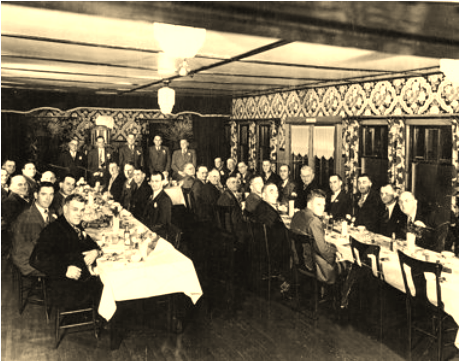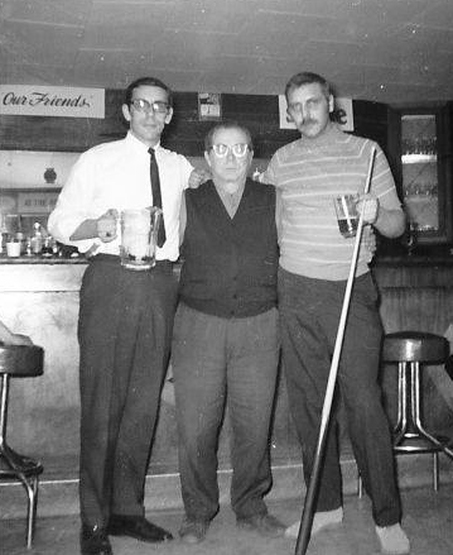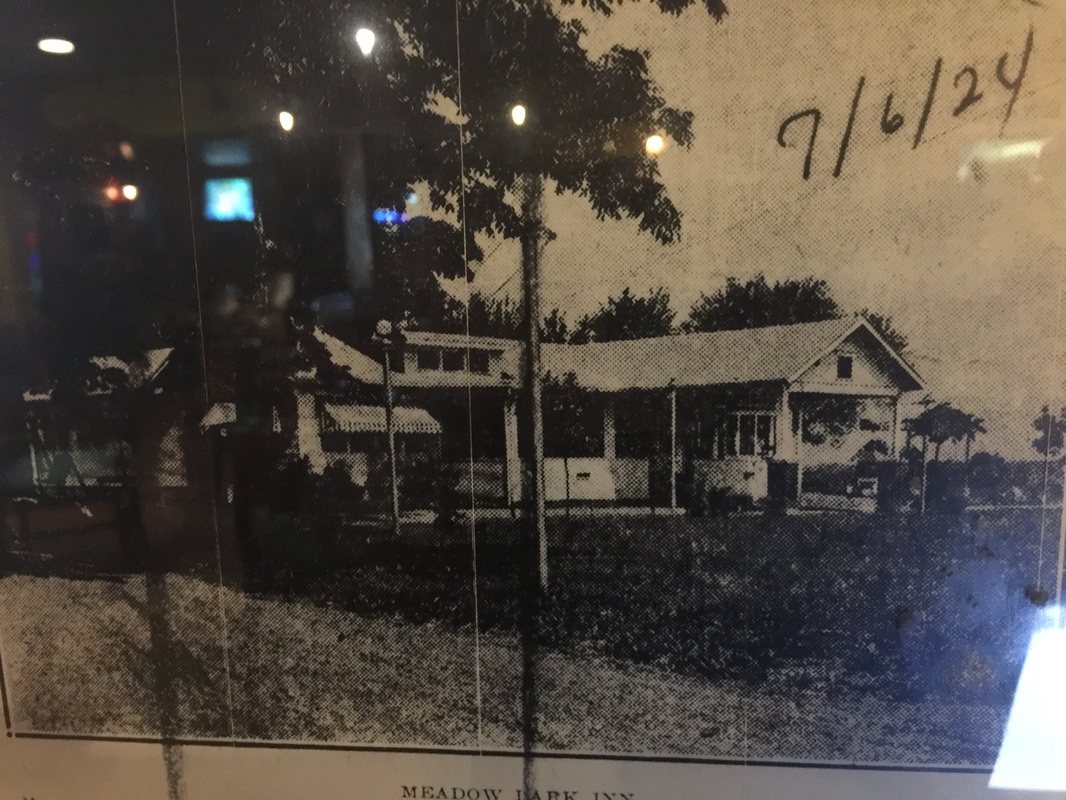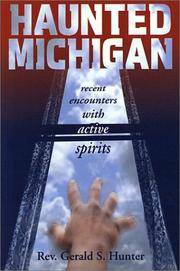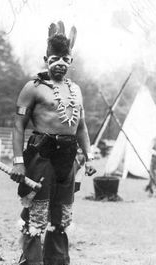
Welcome to the Roadhouse Grill and Bar.
American Indians, Politicians, Stage Coach Drivers, Bootleg Runners, and possibly some Ghosts, all had a seat here. But since 1967 the Denda’s have practiced their family's traditional hospitality with good food, good company, good drinks and little rock n' roll on the weekends. Aleksander and Leah Denda thank you for making a wise decision and stopping in. Now let us pamper you. You are among friends here. While you’re here, you are the most important person in the room. Imagine one hundred years ago on the very spot you’re sitting, a road weary traveler is deciding what to eat and drink after many hours on the road and on the dodge. Once a family farm, back then it was called the Meadowlark Inn. The year is 1920 and as you look around you eye the locals and the ones passing through. A variety of hats announces some as hard working class, others as Stylish and well heeled. Only a few feet away, a well worn two track road in need of repair. Lansing avenue is a major throughfare in these parts, and a good stopping over point is here. A halfway point for the Chicago to Detroit run for smugglers of illegal liquor. Deals are made or broken over a good meal and drinks. Rum runners make it a point to stop by on their way back to settle scores or mix up some gossip, politics and family bragging. Or to add to the rumor of who or what is hidden in a boarded up portion of our basement. (Yes, the rumor still exists today along with a ghost story or two.) The eatery survived Prohibition, but not a fire. On Memorial Day, 1970 a conflaguration led to major renovations. We came back stronger then ever. So rest awhile and feel the history as you enjoy your good food and drink. You’re here now, and the time is all yours. 
Peek Through Time:
Blackman Township's Roadhouse rife with legends, and maybe ghosts! By Leanne Smith November 01, 2011 If a building stands long enough, it’s bound to collect a few legends, rumors — and maybe even ghosts. Such is the case with the Roadhouse, 4112 Lansing Ave. The Blackman Township land on which the old tavern sits was home to the American Indians until the 1830s, when it was settled by a prominent Jackson County pioneer family. Through the years, it also was possibly a stagecoach stop and maybe a Prohibition-era “blind pig” that sold bootleg liquor and hosted mobsters, one of whom might be buried in the basement. The building definitely started life as the Meadow Lark Inn, first a homey country inn selling home-cooked meals of home-grown poultry and produce and then a classy dining spot for banquets, parties and weddings. “It’s always been a gathering place where people have a good time,” said Aleksandar Denda, who owns the business now with his wife, Leah Kalis Denda. “It kind of has a life and momentum of its own and lots of stories.” According to the 1881 “History of Jackson County, Michigan,” the land that encompasses the Roadhouse was settled by Enoch Fifield, who came here in 1831 from Massachusetts. The trail in front of their farmhouse, which is now Lansing Avenue, was a major north and south route for stagecoaches heading to and from Jackson and Lansing. A 1929 Jackson Tribune article said Enoch’s wife, Abigail, often hung a red scarf on a pole outside the farmhouse to let stagecoach drivers know if they were running on time or not. It’s also possible that the Fifield home became a travelers’ rest stop for food and drink. The Fifields also were hosts of a farewell feast for the final tribe of American Indians to leave Jackson County. A July 6, 1924, Citizen Patriot article recounting the event said that after the meal, the tribe paraded down the road, faced about and stood in silence before giving the Fifields a farewell salute. “When I was a kid, we loved to dig around behind the building to find old arrowheads,” said Leah Denda, whose parents, Al and Tina Kalis, bought the tavern in the 1960s. The final Fifield to own the farm was Frank, a township supervisor for six years, county sheriff for four years and chief deputy warden at Michigan State Prison for 10 years. He lived there until 1885 and sold the property in 1888. The land passed through several hands, during which time the inn was built. It was finally bought by Charles J. Stevens and his wife, who named it the Meadow Lark Inn and expanded it in 1924 with the idea of serving old-fashioned, home-cooked farm dinners to travelers and city residents “out of touch with farm life.” The Dendas have heard rumors that tell a somewhat different story of the inn from 1920 to 1933 during Prohibition, when the Meadow Lark Inn was reputed to be a speakeasy. “Supposedly you had to show a card to come in,” Leah Denda said. “We heard it was a hangout for mobsters traveling to and from Chicago or Detroit. They played a lot of jazz music here.” Pete Truskolaski, 78, of Rives Township, whose family bought the inn in the mid-1950s, also heard those stories and the one about the mobster who may be buried in a boarded-up, sand-filled portion of the basement. “My parents would never let me dig it out, so I figured it was either the room for the bootleg liquor or there is a body in there,” Truskolaski said. By 1940, under the ownership of Monty S. Fryt, the Meadow Lark Inn became a fine-dining establishment, serving Frankenmuth-style chicken, steaks and seafood. It quickly became a hot spot for company parties and banquets. “We’ve had many older people come in and tell us how they got married here or had their company parties here,” Leah Denda said. “When my parents bought it, I remember all sorts of Blue Willow china and crystal and silverware. There was a canopy out front where people would drive up and have a doorman help them out.” Truskolaski’s father, Walter Truskolaski, bought the inn from Fryt. In 1967, they sold it to Al Kalis, who had left his job with Detroit Edison and moved his family from Wyandotte. On Memorial Day 1970, an intruder broke into the wooden frame building and set fire to some pizza boxes. Passersby reported flames shooting out a side fan and called the fire department, which extinguished the flames but not before the interior of the tavern was badly damaged. The fire caused $20,000in damage to the $35,000 business, and only about $2,000 was covered by insurance. About 30 family, friends, neighbors, patrons and employees rallied and cleaned out the burned equipment and building interior, and cleaned up what could be salvaged. The Roadhouse reopened later that year. The Dendas have done even more restoration to bring back some of the old inn’s features, including reinstalling glass-paned paneled doors and uncovering wooden floors and front windows. “It’s a landmark, and there is a certain feeling of history about the place,” Leah Denda said. “We’d like to bring more of the old building and its history back to life.” Historical Roadhouse Tidbits • The American Indians who dined with the Fifield family on the site of the Roadhouse before leaving were among about 1,500 men, women and children who were collected at a camp on Moody Hill, now a part of Ganson Street in Jackson. U.S. soldiers escorted them to Detroit, from which they were sent to a reservation in Green Bay, Wis. • The land across the street from the Roadhouse was once part of an American Indian burial ground. • The nearby Fifield Cemetery is on land that was once part of the Fifield farm. • Lansing Avenue once was the state’s main north-south artery linking Jackson to Lansing and northern Michigan. The road’s heyday ended in the late 1950s with the opening of U.S. 127. • Cantaloupe grown from special seeds was a popular menu item in the 1920s, when the Roadhouse was called the Meadow Lark Inn. Owner Charles J. Stevens grew five acres of the melon to meet the demand. • Before the property was divided, there was a fence and trailing roses that led to a pond. A 1930 mural on the wall in the back room of the Roadhouse is all that remains of the scene today. • The Meadow Lark Inn was the place for parties in the 1940s, including one special Christmas party. Aeroquip founder Peter Hurst, a native of Germany, was considered an “enemy alien” and barred from his own plant by the government during World War II. The company moved its 1941 Christmas party from the plant to the inn so Hurst could attend. “I was so touched that I had tears running down my cheeks,” Hurst wrote in his autobiography I Came To Stay, “This can only happen in America. Here I am, officially classified as an enemy alien, and everybody tries so hard to make me feel at home.” ORIGINAL ARTICLE: http://www.mlive.com/news/jackson/index.ssf/2011/10/peek_through_time_blackman_tow.html |

Our historical ghost stories and legends
By Leanne Smith November 01, 2011 People sometimes come into the Roadhouse and ask owners Leah and Aleksandar Denda if they know the place is haunted. They smile and nod. “Anyone who has worked here a long time will definitely tell you it’s haunted,” Leah Denda said. “People have heard laughter and talking when no one was in the room. Others have been tickled, pushed and touched when no one was near them. And the place has bizarre electrical problems.” An old player piano that goes back to the bar’s days as the Meadow Lark Inn still sits in a back room. “One night, a worker who was closing the place heard it playing when no one else was back there,” Leah Denda said. After investigating, she said she found an old woman playing it who didn’t know she was dead. “Needless to say, that worker never wanted to close the place by herself again,” Leah Denda said. A psychic who visited the Roadhouse told the Dendas she talked to a ghost named Edward. “She said he wanted someone to know he did not commit suicide like it was reported,” Leah Denda said. “He said he was killed by mobsters over two women named Julia and Caroline.” A friend was helping with some construction after hours when he heard somebody whistling. Since he was alone in the place, it kind of spooked him, Aleksandar Denda said. “I laughed about it and said how ridiculous I thought it was one night when I was sitting here at the bar,” he said. “Something pushed really hard on the back of my chair and when I turned around to see who it was, no one was there.” A NOTE FROM A READER:
thrasymacus Oct 27, 2013 There's a good book about ghosts in Michigan, and the ghosts of Jackson are in it. The author's last name is Hunter and there's more than one book he's written. The Roadhouse is in it, the Jackson Antique Mall, Bella Notte, Michigan Theater and others in the area. EDITOR'S NOTE: We searched online and found the book! http://www.biblio.com/book/haunted-michigan-recent-encounters-active-spirits/d/737542754?aid=frg&utm_source=google&utm_medium=product&utm_campaign=feed-details&gclid=CKO4spi1rc8CFQsoaQodEewFXA Historical Roadhouse Tidbits
• The American Indians who dined with the Fifield family on the site of the Roadhouse before leaving were among about 1,500 men, women and children who were collected at a camp on Moody Hill, now a part of Ganson Street in Jackson. U.S. soldiers escorted them to Detroit, from which they were sent to a reservation in Green Bay, Wis. • The land across the street from the Roadhouse was once part of an American Indian burial ground. • The nearby Fifield Cemetery is on land that was once part of the Fifield farm. • Lansing Avenue once was the state’s main north-south artery linking Jackson to Lansing and northern Michigan. The road’s heyday ended in the late 1950s with the opening of U.S. 127. • Cantaloupe grown from special seeds was a popular menu item in the 1920s, when the Roadhouse was called the Meadow Lark Inn. Owner Charles J. Stevens grew five acres of the melon to meet the demand. • Before the property was divided, there was a fence and trailing roses that led to a pond. A 1930 mural on the wall in the back room of the Roadhouse is all that remains of the scene today. • The Meadow Lark Inn was the place for parties in the 1940s, including one special Christmas party. Aeroquip founder Peter Hurst, a native of Germany, was considered an “enemy alien” and barred from his own plant by the government during World War II. The company moved its 1941 Christmas party from the plant to the inn so Hurst could attend. “I was so touched that I had tears running down my cheeks,” Hurst wrote in his autobiography I Came To Stay, “This can only happen in America. Here I am, officially classified as an enemy alien, and everybody tries so hard to make me feel at home.” ORIGINAL ARTICLE: http://www.mlive.com/news/jackson/index.ssf/2011/10/peek_through_time_blackman_tow.html |
|
|

